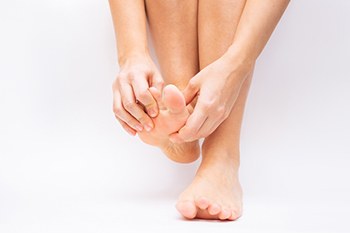Causes of Big Toe Stiffness

The big toe, or hallux, is more than just a digit on your foot. It's essential for your daily activities, like walking, standing, and maintaining balance. However, stiffness in the big toe can severely impact mobility and comfort. Big toe stiffness, medically known as hallux rigidus, can stem from various factors. Most cases are of unknown origin, while others result from injuries damaging the joint's cartilage. Structural changes, like a shifted or bent first metatarsal, or even genetic predispositions, can contribute to its development. Additionally, conditions such as osteoarthritis, gout, or bunions can increase the risk of big toe stiffness. Pain, swelling, and redness around the joint, along with stiffness and reduced range of motion, are common symptoms. If you're experiencing symptoms of big toe stiffness, it's suggested that you make an appointment with a podiatrist, who can offer the appropriate treatment option.
Toe pain can disrupt your daily activities. If you have any concerns, contact Vincent, Vess of Fourth River Foot & Ankle. Our doctor can provide the care you need to keep you pain-free and on your feet.
What Causes Toe Pain?
Most severe toe pain is caused due to a sports injury, trauma from dropping something heavy on the toe, or bumping into something rigid. Other problems can develop over time for various reasons.
Toe pain can be caused by one or more ailments. The most common include:
- Trauma
- Sports injury
- Wearing shoes that are too tight
- Arthritis
- Gout
- Corns and calluses
- Hammertoe
- Bunions
- Blisters
- Ingrown toenails
- Sprains
- Fractures (broken bones)
- Dislocations
When to See a Podiatrist
- Severe pain
- Persistent pain that lasts more than a week
- Signs of infection
- Continued swelling
- Pain that prevents walking
Diagnosis
In many cases the cause of toe pain is obvious, but in others, a podiatrist may want to use more advanced methods to determine the problem. These can range from simple visual inspections and sensation tests to X-rays and MRI scans. Prior medical history, family medical history, and any recent physical traumatic events will all be taken into consideration for a proper diagnosis.
Treatment
Treatments for toe pain and injuries vary and may include shoe inserts, padding, taping, medicines, injections, and in some cases, surgery. If you believe that you have broken a toe, please see a podiatrist as soon as possible.
If you have any questions please feel free to contact our offices located in Pittsburgh, White Oak, and McKeesport,PA . We offer the newest diagnostic tools and technology to treat your foot and ankle needs.
